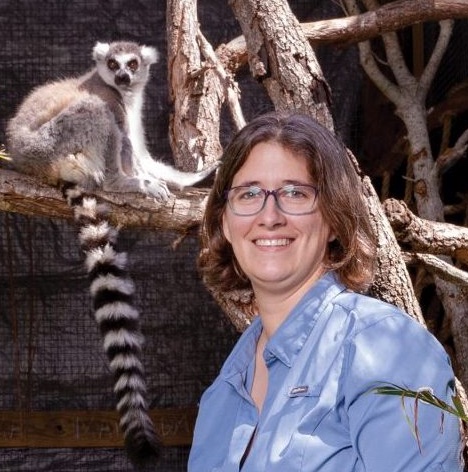
Proctor, Darby

Darby Proctor
Associate Professor | College of Psych. and Liberal Arts: School of Psychology
Assistant Dean | College of Psych. and Liberal Arts
Co-Director, Animal Research Center
Contact Information
Expertise
Personal Overview
Dr. Proctor's research focuses on decision-making in nonhuman primates in order to understand the evolutionary roots of human decision-making biases. She was instrumental in setting up a collaboration between Florida Tech and Brevard Zoo and conducts research with their animals, most notably the spider monkeys, at the Animal Research Center, which she co-directs. In addition to this line of research, she is interested in pedagogy and increasing student involvement in the classroom. She created roachlab.org to provide hands-on animal experiences for undergraduate students at Florida Tech and beyond. Before coming to Florida Tech, she was an NIH-funded IRACDA Fellow in Research and Science Teaching (FIRST) at Emory University and Emory National Primate Research Center. She received her Ph.D. in psychology from Georgia State University, where she worked at the Language Research Center.
Educational Background
B.A. University of Florida, Biological Anthropology
M.S.M. University of Florida, Management
M.S. Georgia State University, Biological Anthropology
Ph.D. Georgia State University, Psychcology - Cognitive Sciences and Animal Behavior
Selected Publications
Peer-Reviewed Articles
Costopoulos, J. S., Proctor, D., Johnson, A. M., & Roberts, S. G. (2021). The impact of malingering on inpatient assault rates. Acta Scientific Neurology, 4(6), 70-81. https://doi.org/10.31080/ASNE.2021.04.0366
Proctor, D. & Smurl, M. (2020). The effect of a nighttime zoo event on spider monkey (Ateles geoffroyi) behavior. Experimental Results, 1(e50), 1-8. https://doi.org/10.1017/exp.2020.56
Proctor, D., & Jones, M. (2020). Cockroaches to the rescue: A new approach to reintroduce animal labs to the psychology undergraduate curriculum. Scholarship of Teaching and Learning in Psychology, Advance online publication. https://doi.org/10.1037/stl0000235
ManyPrimates* (2019). Collaborative open science as a way to reproducibility and new insights in primate cognition research. Japanese Psychological Review, 62(3), 205-220. *ManyPrimates is an international collaboration of primatologists. We publish under this name to emphasize the collaborative nature of this research.
Calcutt, S. E., Proctor, D., Berman, S., & de Waal, F. B. M. (2019). Chimpanzees (Pan troglodytes) are more averse to social than non-social risk. . Psychological Science, 30(1), 105-115.
Proctor, D., Calcutt, S. E., Burke, K., & de Waal, F. B. M. (2016). Intranasal oxytocin failed to affect chimpanzee (Pan troglodytes) social behavior. Animal Behavior & Cognition, 3(3), 150-158. doi:10.12966/abc.04.08.2016
Proctor, D., Williamson, R. A., Latzman, R. D., Brosnan, S. F., & de Waal, F. B. M. (2014). Gambling primates: reactions to a modified Iowa Gambling Task in humans, chimpanzees and capuchin monkeys. Animal Cognition, 17, 983-995. doi:10.1007/s10071-014-0730-7
Proctor, D., Williamson, R. A., de Waal, F. B. M., & Brosnan, S. F. (2013). Chimpanzees play the ultimatum game. Proceedings of the National Academy of Sciences. doi:10.1073/pnas.1220806110
Proctor, D., & Brosnan, S. F. (2013). Visual processing speed in capuchin monkeys (Cebus apella) and rhesus macaques (Macaca mulatta). International Journal of Comparative Psychology, 26, 166-175.
Salwiczek, L. H., Prétôt, L., Demarta, L., Proctor, D., Essler, J., Pinto, A. I., . . . Bshary, R. (2012). Adult cleaner wrasse outperform capuchin monkeys, chimpanzees and orangutans in a complex foraging task derived from cleaner–client reef fish cooperation. PloS One, 7(11), e49068.
Proctor, D. P., Lambeth, S. P., Schapiro, S. J., & Brosnan, S. F. (2011). Male chimpanzees' grooming rates vary by female age, parity, and fertility status. American Journal of Primatology, 73(10), 989-996. doi:10.1002/ajp.20964
Horner, V., Proctor, D., Bonnie, K. E., Whiten, A., & de Waal, F. B. M. (2010). Prestige affects cultural learning in chimpanzees. PloS One, 5(5), e10625. Retrieved from http://dx.doi.org/10.1371%2Fjournal.pone.0010625
Campbell, M. W., Carter, J. D., Proctor, D., Eisenberg, M. L., & de Waal, F. B. M. (2009). Computer animations stimulate contagious yawning in chimpanzees. Proceedings of the Royal Society B: Biological Sciences, 276(1676), 4255-4259. doi:10.1098/rspb.2009.1087
Reviews, Commentaries And Chapters
ManyPrimates* et al. (2022). Collaboration and open science initiatives in primate research. In B. Schwartz & M. J. Beran (Eds.), Primate Cognitive Studies. Cambridge University
Press. https://doi.org/http://doi.org/10.1017/9781108955836.023
*ManyPrimates is an international collaboration of primatologists. We publish under this name to emphasize the collaborative nature of this research.
Ellis, K. M., & Proctor, D. (2017). Public Records. In T. K. Shackelford & V. A. Weekes-Shackelford (Eds.), Encyclopedia of Evolutionary Psychological Science (pp. 1-5). Cham: Springer International Publishing.
Brosnan, S. F., de Waal, F. B. M., & Proctor, D. (2015). Reciprocity in non-human primates. In S. Preston (Ed.), The Interdisciplinary Science of Consumption. Oxford: Oxford University Press.
Proctor, D., Williamson, R. A., de Waal, F. B. M., & Brosnan, S. F. (2013). Reply to Henrich and Silk: Toward a unified explanation for apes and humans. Proceedings of the National Academy of Sciences, 110(33), E3050. doi:10.1073/pnas.1309100110
Proctor, D., Williamson, R. A., de Waal, F. B. M., & Brosnan, S. F. (2013). Reply to Jensen et al.: Equitable offers are not rationally maximizing. Proceedings of the National Academy of Sciences, 110(20), E1838. doi:10.1073/pnas.1304306110
Proctor, D., Brosnan, S. F., & de Waal, F. B. M. (2013). How fairly do chimpanzees play the ultimatum game? Communicative & Integrative Biology, 6(3), e23819. Retrieved from http://www.landesbioscience.com/journals/cib/article/23819/
Proctor, D. (2013). Animal Friendships by Anne Innis Dagg. The Quarterly Review of Biology, 88(3), 246-247. doi:10.1086/671517
Proctor, D., & Brosnan, S. F. (2011). Political primates: What other primates can tell us about the evolutionary roots of our own political behavior. In P. Hatemi & M. McDermott (Eds.), Man is by Nature a Political Animal: Evolution, Biology and Politics (pp. 47-71). Chicago: University of Chicago Press.
Recognition & Awards
2021 Kerry Bruce Clark Faculty Excellence Award for Teaching
Research
- Behavioral economics and decision-making in nonhuman primates in collaboration with Brevard Zoo
- Co-Director of the Animal Cognitive Research Center
- Roachlab.org - Bringing animal models to psychology undergraduate education

 Give to Florida Tech
Give to Florida Tech